Share
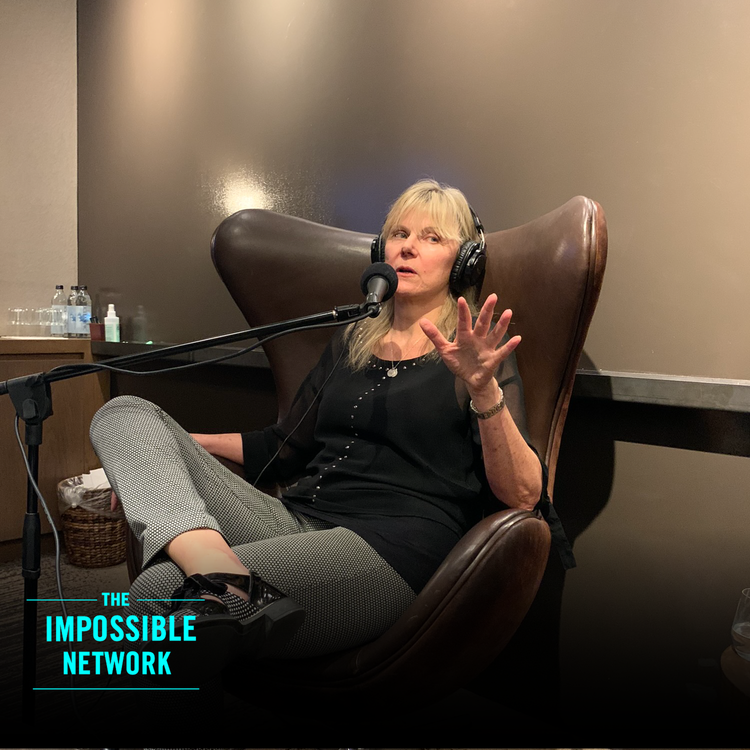
The Impossible Network
092: Lorna Davis - Corporate Social Impact, Leadership Values and Vision
Guest Overview
Born in South Africa in the age of Apartheid, her education, parental guidance, curiosity, and worldly ambitions set her on the path to a stellar career in international business and marketing and finally leading Danone to become the first billion-dollar entity to become a public benefit corporation - welcome this week’s guest Lorna Davis.
Lorna Davis is a transformational thinker, leader, and visionary for why and how organizations can combine social, and environmental priorities with their financial imperatives to deliver improved business performance. As a highly respected coach, international speaker Lorna also serves on a number of boards to help them embrace meaning and purpose.
In Part One of this two-parter, we cover Lorna’s early life in South Africa, her parent’s influence, how her education and her Pollyanna-ish optimistic view of the world helped carve a successful career. We discuss Lorna’s social purpose epiphany when working in China in 2006. Lorna explains how she left China changed, and ultimately returned to Danone with a mission to help them become a purpose-driven company. Lorna recounts the practical realities of Danone’s evolution to a B Corp under her leadership in the US as Chief Manifesto Catalyst.
We also discuss how Lorna became an evangelist for the B Corp movement, the tools available for all businesses and her advisory role with organizations on their sustainability strategies.
I hope you’re inspired by the leadership values and vision of Lorna Davis.
What We Discuss
Her parental impact
We discuss her upbringing in apartheid South Africa
Lorna’s sense of abundance the opportunity the world offered
Her single-sex high school
Her sports focus
Learning routine discipline and order working for her at school
Studying psychology and anthropology
Breaking into Unilever
Her social purpose epiphany in China
Understanding that she could not continue to walk away from her responsibilities as a leader
Being lured back to Danone
Coming to the US
Taking on the B Corp Challenge
Managing shareholder expectations
Social Links
Email - lornadavisuk@yahoo.com
Links In The Show
More episodes
View all episodes
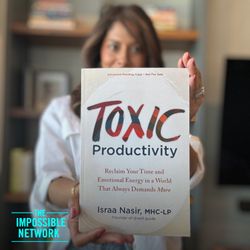
259. Israa Nasir – Breaking Free From Toxic Productivity
25:46||Season 7, Ep. 259Two weeks ago at SXSW in Austin, I reconnected with previsous guest, Israa Nasir, therapist, clinical strategist, and author of "Toxic Productivity,” During our short conversation Israa explains the mindset that compels us to chase relentless achievement, often as a means to cope with challenging emotions such as guilt, shame, and feeling left behind.Israa shares her personal journey and why she wrote her book. She looks at how society's views on productivity impact our work, relationships, parenting, and self-image. We also discuss the emotional side of productivity advice. It is important to recognize our core values to achieve healthy productivity.We also cover the impact of AI on the future of work, mental health, and leadership. Israa highlights both the risks and opportunities that AI presents, stressing the need for thoughtful guardrails and intentional use to enhance, rather than diminish, human value and connection.Whether you're grappling with burnout, feeling pressured to constantly perform, or curious about navigating productivity in the age of AI, this conversation offers thoughtful insights and practical advice. Enjoy the episode.Social Links Instagram Well.guide Israa’s Linkedin Links In the ShowToxic ProductivityHBR article on Toxic productivity Timestamps00:00 Introduction and Reconnection01:28 Discussing Toxic Productivity02:25 Personal Journey and Book Genesis03:16 Impact on Relationships and Society06:20 AI and the Future of Work15:11 AI in Mental Health: Risks and Benefits15:56 Regulatory Challenges in AI Adoption16:49 Disparities in AI Adoption Among Clinicians18:30 Personal Reflections on Productivity20:04 Where to Find the Book20:48 Future Plans and Career Aspirations21:24 Speaking Engagements and Workshops23:21 Final Thoughts on Leadership and Productivity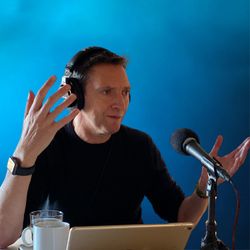
258. The AI FlyWheel – Are You In or Out?
05:32||Season 7, Ep. 258In this episode, I explore the concept of the "AI flywheel" - the accelerating momentum of artificial intelligence development that's either carrying us forward or leaving us behind. As we approach the critical juncture of Artificial General Intelligence we need to understand what makes us uniquely human, something I discussed with recent guest, Dom Heinrich. Key PointsThe Accelerating Pace: Recent releases from Anthropic (Claude 3.7 Sonnet), OpenAI (GPT-4.5), Google (Gemini), and Grok demonstrate how each breakthrough contributes to faster development.Choosing Your Tools: Mark uses different AI models for specific purposes - Claude for creative work, Gemini for Google's ecosystem, and Grok for Twitter-based insights.Human Uniqueness: As AI handles analytical tasks with ease, our distinct value may lie in emotional intelligence, ethical reasoning, and wisdom from lived experience.Finding Balance: Technology should be used thoughtfully. AI might help us become more human by handling routine tasks, freeing us to focus on relationships, creativity, and empathy.Notable Quote"As controllers of technology, we must balance technological connection with disconnection, have the discipline to lose ourselves in our unconscious minds, and have the focus to listen to our souls."Join the ConversationI invites listeners to share how they're navigating the AI flywheel and what human qualities they believe will become more valuable as AI advances.Timestamps00:00 Introduction 00:08 The AI Flywheel Concept00:38 Recent AI Developments01:49 Choosing the Right AI Tool02:49 Human Qualities in the Age of AI03:43 Balancing Technology and Humanity04:33 Engaging with AI Technology05:12 Conclusion and Call to Action LinksLinkedin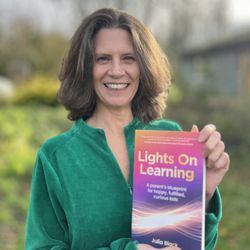
257. Transforming Education with Julia Black's Lights On Framework
34:10||Season 7, Ep. 257In this follow-up conversation, Julia Black, a former TV producer turned education innovator, shares insights from her groundbreaking Lights On framework and her book 'Lights On Learning: A Parent's Blueprint for Happy, Fulfilled, Curious Kids.' Julia describes how her framework challenges traditional education paradigms by focusing on internal learning processes and parental involvement to treat disengagement as an opportunity for growth. She discusses the six learning signatures and provides real-life examples, including a case study of a six-year-old, demonstrating transformative changes. The discussion also touches on the relevance of her approach in the age of AI, emphasizing the importance of creativity and problem-solving. Additionally, Julia talks about her upcoming audiobook and collaborative projects aimed at building a community of curious, fulfilled learners.Timestamps00:00 Introduction 01:25 Julia's Journey and Book Release01:55 Understanding the Lights On Approach05:28 Parental Role in Education10:06 Real-Life Success Stories18:35 Empowering Parents and Teachers32:12 Future Projects and ConclusionSocial Links Explorium Facebook Instagram Links Lights On Learning Book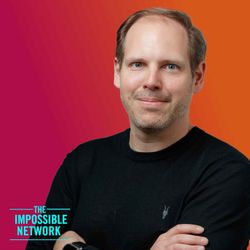
256. Dominik Heinrich - Navigating the Future: Design, AI, and the Human Touch
54:03||Season 7, Ep. 256My guest this week is Dominik Heinrich, a visionary working at the intersection of design, AI technology, and human experience. As the co-founder of the Creative AI Academy, faculty member at Pratt Institute, and Head of Global Design at Coca-Cola Company, Dom brings a unique perspective on how AI is reshaping creativity and innovation.Dom's journey is fascinating—from his childhood in Germany drawing maps that would foreshadow his future global agency network, to driving innovation at McCann and MRM in NYC, to forming the Creative AI Academy. He has become a highly respected, influential voice in AI and design.What I loved about this conversation, was how Dom emphasized the importance of remaining curious, authentic, and most importantly, human in an increasingly AI-driven world.We explore everything from his early days as an entrepreneur and agency owner to his current mission of helping organizations and individuals navigate the transformation that AI brings to creative work. What emerges is not just a discussion about technology but a deeper reflection on how we can become better humans in an AI-enhanced future.Now over to Dom. Time stamps 00:00 Introduction 00:50 Meet Dominic Heinrich: A Visionary in AI and Design02:20 The Human Side of AI: Dom's Personal Journey03:54 Early Influences and Career Beginnings11:07 From Germany to New York: A Career Evolution13:20 Pioneering AI in Creativity and Design19:30 The Intersection of Roles: Coca-Cola, Creative AI Academy, and Pratt23:25 The Future of Creative Agencies in an AI-Driven World26:57 The Future of Agencies and Creativity27:41 AI Mind Shift and Critical Thinking28:22 Challenges in Creativity and Education33:31 The Role of AI in Human Behavior36:20 Preparing for a Rapidly Changing Future42:02 Personal Insights and Reflections42:07 Thoughts on AGI and Future Technologies44:49 Principles and Inspirations47:54 Managing Fears and Uncertainties51:22 Book Recommendations and Networking52:43 Final Thoughts and FarewellSocial Links Linkedin www.linkedin.com/in/domheinrichCreative AI Academy Links in the ShowBook AI 2041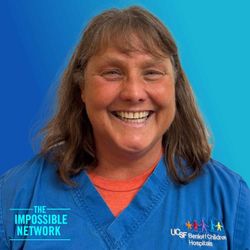
255. Amy Gubser - "I Can Do Hard Things" How a 56-Year-Old Grandmother Conquered Shark-Infested Waters
01:30:18||Season 7, Ep. 255Amy Gubser Amy Gubser, is an extraordinary 56-year-old grandmother who this year became the first person ever to complete an unassisted swim from the Golden Gate Bridge in SF to the Farallon Islands - a 30-mile stretch of cold, shark-infested waters off the California coast. Moreover, what makes this achievement even more remarkable is that Amy only started her marathon swimming journey aged 46.Throughout a fascinating conversation, Amy describes her path from early morning swims in San Francisco Bay through increasingly arduous challenges, including consequently crossing the treacherous North Channel between Ireland and Scotland. Furthermore, Amy shares her insights into the physical and mental preparation required for ultra-marathon swimming, from nutrition strategies to managing the understandable fear of great white sharks and jellyfish swarms.In addition to her swimming achievements, Amy discusses how her work as a nurse has informed her mental toughness, the importance of breaking age-related stereotypes, and as a result, her mission to inspire others - especially women - to pursue ambitious goals at any age.With upcoming swims planned for Scotland's deep and mysterious Loch Ness, therefore Amy is proof that human potential knows no bounds when matched with determination, careful preparation, and above all her simple mantra: 'I can do hard things.'Amy's story is an inspiring reminder that it's never too late to pursue extraordinary achievements. Note to self! Now over to Amy. Timestamps00:00 Introduction03:10 Who is Amy as a Human?05:35 Childhood and Family Background10:48 Early Swimming and Lifeguarding14:26 Nursing Career and Mental Toughness26:12 Rediscovering Swimming33:24 First Marathon Swim: Gibraltar Straits35:59 Conquering Lake Tahoe37:20 The North Channel Challenge39:24 Molokai to Oahu Swim39:56 Local Swims and Challenges40:47 The Alcatraz Swim42:15 Manhattan Island Swim45:23 Nutrition and Hydration Strategies53:18 Facing the Farallon Islands55:34 Shark and Jellyfish Encounters01:01:32 Mental and Physical Endurance01:06:24 Inspiration and Future Goals01:11:11 Advice for Aspiring Swimmers01:18:04 Final Thoughts and Inspirations Social posts Instagram - https://www.instagram.com/amygubser92?igsh=MzRlODBiNWFlZA== Links in show Books:"The Devil's Teeth" (Book about the Farallon Islands mentioned as inspiration)- "Tough Broads" by Caroline Paul (Recent book Amy highly recommends)- Young Woman in the Sea (About Trudy Ederle, first woman to swim the English Channel) Films/Media: Documentary about Mercedes Gleitze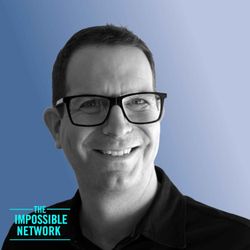
254. Noam Sagi - Transforming Wellness: A Path to Personalized Wellbeing
01:45:22||Season 7, Ep. 254In this episode of the Impossible Network, Mark interviews Noam, a pioneering psychotherapist and co-founder of VidaVii. Noam's captivating journey from his upbringing on a kibbutz near the Gaza border to establishing a wellness technology hub in London is explored in depth. The conversation touches on communal living, military service, corporate culture, and the importance of authenticity. Noam shares insights on navigating childhood and parenting in different eras, the impact of social media on mental health, and the potential future challenges for children growing up in isolated environments. Noam also highlights the integration of body-centered psychotherapy, the concept of 'befriending vulnerability,' and innovative wellness treatments like cryotherapy and breathwork. Mark and Noam discuss the shift from symptomatic treatment to preventative health through biohacking, AI-driven health suggestions, and the significance of a balanced approach to life following the 80/20 rule. Noam also shares his personal stories of emotional resilience, and the harrowing yet inspiring account of Noam's mother's kidnapping and release by Hamas, and his hope for peace amidst global conflicts.TimeCodes00:00 Introduction 01:14 Who is Noam as a human?04:26 The Kibbutz Experience08:10 Reflections on Childhood and Group Dynamics21:06 Transition to Adulthood and Military Service22:12 Career Shift to Psychotherapy35:48 Founding VidaVi1: A Wellness Tech Venture48:02 Innovative Health Solutions for Everyone49:04 The Power of Cryotherapy: Real-Life Stories50:06 Bringing Nature's Best to Urban Centers50:41 The Science Behind Dry Cryotherapy53:00 Personalized Health and Wellness01:07:20 The Future of Health: AI and Technology01:17:45 Personal Reflections and Inspirations01:27:24 A Personal Story of Resilience and Hope01:42:47 Final Thoughts and Call to ActionSocial Links VidaviiLinkedin Links in the showCure" (or "Cured") by Dr. Jeff Rediger - specifically recommended by Noam for understanding medicine and wellnessOutlive" by Peter Attia - mentioned in discussion but not specifically recommended
253. Denzil Monk On Storytelling, Regenerative Economics, and Creative Resistance
01:33:04||Season 7, Ep. 253Welcome back to the start of Season 6 of The Impossible Network. Today’s guest is Denzil Monk, a filmmaker, social entrepreneur, and accidental academic. Denzil is dedicated to reshaping the narrative for his home region of Cornwall, England, advocating for a more inclusive and regenerative approach to media, culture, and the economy. From advocating for Cornish public service mediaImpactful film productions to pioneering the ideas like Man Engine, the largest performing mechanical puppet ever created in Britain, Denzil’s work is rooted in a deep sense of place, purpose, and the power of storytelling. In this episode, we explore his journey, his thoughts on the need to rethink capitalism, and the impact local communities can have on the global stage. Thanks to Stephen Davies for the connection.Now over to Denzil. Time stamps 01:21 Who is Denzil? 07:15 The Impact of the 1980s on Denzil's Worldview08:42 Cornish Identity and the Mining Heritage09:51 The Global Connection and Local Responsibility12:59 Denzil's Journey into Social Entrepreneurship22:32 Advocating for Cornish Public Service Media30:45 Reimagining Economic Systems and Local Empowerment47:53 The Role of Storytelling in Social Change50:31 The Power of Connections51:10 Journey into Academia54:12 Creating Bocena Productions56:03 Sustainable Filmmaking01:08:51 The Man Engine Project01:19:56 Advice for Aspiring Filmmakers01:22:23 Personal Reflections and Inspirations01:23:37 Quick Fire Questions01:32:40 Final Thoughts Social Media Denzil’s Website BosenaLinkedInInstagramShow Links Books “The Dawn of Everything” by David Graeber and David Wengrow“Donut Economics” by Kate RaworthFilms and Documentaries:“The Corporation”“Manufacturing Consent” by Noam Chomsky“Dreams” by Akira Kurosawa“Memoria” by Apichatpong Weerasethakul “Kneecap”
252. Reality Distortion Shapers: The Power of Attitude and Action in a Shifting World
03:45||Season 6, Ep. 252Today, I want to discuss a concept that's been on my mind lately: what it truly means to be a reality distortion shaper. This idea was inspired by Steve Jobs' infamous "reality distortion field" - his almost mythical ability to make people believe in the impossible and, through sheer force of vision, bring ideas to life.As I unboxed my new iPad Air and installed iOS 17, I couldn't help but reflect on how far we've come from Apple's beginnings. The evolution of Apple, and now Apple Intelligence, is another chapter in the legacy Jobs left behind—a legacy built on thinking differently, on bending reality to the will of a powerful idea.Jobs' reality distortion field wasn't just about charisma or leadership. It was a powerful fusion of attitude and action. And it's this combination that defines what I call "reality distortion shapers." They're the ones who break new ground, challenge norms, and refuse to accept the limitations that the world presents.And here's the thing—it wasn't just Jobs who had this ability. Throughout history, we've seen people like Elon Musk, Walt Disney, Nikola Tesla, and Oprah Winfrey exhibit this same characteristic. What they all share is a deep belief that reality can be shaped by their ideas, their attitudes, and most importantly, their actions.This spirit of innovation is perfectly captured in Apple's "Here's to the Crazy Ones" campaign. It celebrated those who think differently—the ones who push boundaries, who disrupt the status quo, who see possibilities where others see limitations. This message resonates even more deeply today, in a world grappling with what many call a polycrisis—multiple global challenges unfolding simultaneously.In the face of constant negativity from doom-mongers and naysayers, it's crucial to remember that each of us has the power to shape reality through our beliefs, our optimism, and our actions. We can either embrace pessimism, letting it define our future, or we can choose optimism, believing that tomorrow can be better than today.Optimism is the fuel that accelerates this process. Without that deep-seated belief that things can change, that the impossible can be achieved, no action will ever take off. It's this combination—of vision, belief, and action—that compounds over time, creating something far greater than what we started with.Each of us can shape reality by harnessing the interplay between our thoughts and our actions. Guests like Jon Alexander and Gavin Fernie Jones do this. The reality distortion shapers of the world aren't afraid to push boundaries and reject limitations. They don't just dream big—they act. And through those small, consistent steps, they bring their vision to life, pulling others along with them.So, as you go through your day, ask yourself: what reality do you want to shape? What action can you take, no matter how small, that moves you closer to your vision? And most importantly, do you believe—truly believe—that you can bend reality in your favor?If there's any truth to the idea that what we think manifests in the world around us, then it's on us—each of us—to think differently. To embrace optimism, not just for ourselves, but for the collective good. Because the future we create starts with the thoughts, feelings, and actions we put into motion today.Remember, as Jobs and Apple have shown us time and again—those who are crazy enough to think they can change the world are the ones who do. The truth is, you're already shaping reality. So I ask: what reality are you shaping? And...What action can you take right now that pushes us all toward a better future?
251. Tony Jones on Augmenting Creativity: AI's Role in Shaping the Future of Creative Work
01:48:20||Season 6, Ep. 251In this weeks episode we dive into the intersection of artificial intelligence and creativity with NY based AI creative trailblazer Tony JonesFrom growing up in Ohio his creative ambitions led him to New York to work in numerous leading ad agencies where he carved out a niche at the intersection of creativity and technology.Today, Tony is the co-founder and head instructor at Creative AI Academy, where he’s on a mission to help organizations and individuals harness the power of AI to enhance their creative processes. He also teaches AI Design at Pratt Institute in Brooklyn, equipping the next generation of creatives with the skills they need to thrive in an AI-augmented future.Tony brings a unique perspective to the conversation about AI and creativity. He sees AI not as a replacement for human ingenuity but as a powerful tool that can augment and amplify our creative capabilities. He’s a strong advocate for embracing AI to stay competitive in today’s fast-changing landscape while emphasizing the critical importance of maintaining human judgment, taste, and ethics.This is a must listen episode for anyone interested in where AI is leading us and how to embrace the unrelenting pace of the change that is underway. Now over to Tony. Time Codes00:00 Intro to Tony Jones02:30 Who is Tony as a human 03:59 Embracing AI in Creativity07:13 Tony's Family and Upbringing16:34 Early Career and Move to New York22:43 Digital Transformation in Advertising26:34 Innovation and AI in Advertising30:52 Founding Creative AI Academy35:18 AI's Impact on Creativity and Industries46:25 Challenges and Adoption of AI57:05 Teaching AI Design at Pratt Institute58:02 Course Structure and Student Projects58:52 Diverse Student Backgrounds01:00:08 Misconceptions About AI and Creativity01:01:34 Personal Experience with AI Tools01:02:49 Impact of AI on Creative Processes01:04:57 Corporate Training and AI Integration01:07:37 Patented Inventions and AI01:10:27 AI in the Advertising Industry01:18:01 Advice for Creatives and Ethical Considerations01:23:54 Future of Education with AI01:30:16 Speculations on AGI and Future Impacts01:35:11 Serendipity and Personal Reflections01:47:02 Conclusion and Final ThoughtsSocial LinksTony on Linkedin Creative Ai Academy On Linkedin Links in the show Creative AI Academy Pratt AI Design Course Andy AwardsMcCannMedia MonksBook - Future AI 2041Podcasts - Last Week in AI AI For humans